高一英语高效课堂资料Book1Unit4 Grammar (2)
高一英语高效课堂资料B1U4阅读 (2)
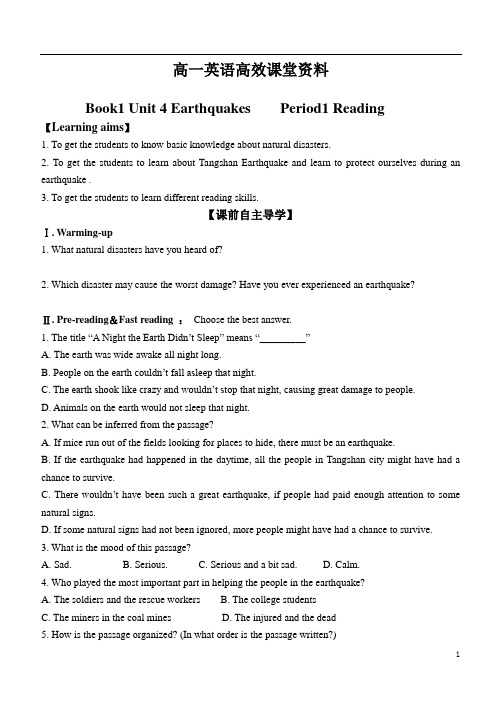
高一英语高效课堂资料Book1 Unit 4 Earthquakes Period1 Reading【Learning aims】1. To get the students to know basic knowledge about natural disasters.2. To get the students to learn about Tangshan Earthquake and learn to protect ourselves during an earthquake .3. To get the students to learn different reading skills.【课前自主导学】Ⅰ. Warming-up1. What natural disasters have you heard of?__________________________________________________________________________________ 2. Which disaster may cause the worst damage? Have you ever experienced an earthquake?__________________________________________________________________________________ Ⅱ. Pre-reading&Fast reading :Choose the best answer.1. The title “A Night the Earth Didn’t Sleep” means “_________”A. The earth was wide awake all night long.B. People on the earth couldn’t fall asleep that night.C. The earth shook like crazy and wouldn’t stop that night, causing great damage to people.D. Animals on the earth would not sleep that night.2. What can be inferred from the passage?A. If mice run out of the fields looking for places to hide, there must be an earthquake.B. If the earthquake had happened in the daytime, all the people in Tangshan city might have had a chance to survive.C. There wouldn’t have been such a great earthquake, if people had paid enough attention to some natural signs.D. If some natural signs had not been ignored, more people might have had a chance to survive.3. What is the mood of this passage?A. Sad.B. Serious.C. Serious and a bit sad.D. Calm.4. Who played the most important part in helping the people in the earthquake?A. The soldiers and the rescue workersB. The college studentsC. The miners in the coal minesD. The injured and the dead5. How is the passage organized? (In what order is the passage written?)A. in order of importanceB. in order of placeC. in order of timeD. in order of position【课内合作探究】Ⅲ.Intensive readingTask 1. Structure: Divide the text into three parts and the main idea of each part.Part 1 (Para.______) __________before the earthquake.Part 2 (Para. _______) what happened during the quake and the _________caused by the quake. Part 3 (Para._______) The_____________ after the earthquakeTask2. What does the passage mainly talk about?The passage mainly talks about a terrible ______that happened in ______( where?) in ______( when? ) and caused great damage to people.Task 3.Deal with long difficult sentences讨论、理解下列长难句1. Mice ran out of the fields looking for places to hide.分析:这是一个复杂的简单句。
高一英语高效课堂资料B1 U4语言运用(定稿)
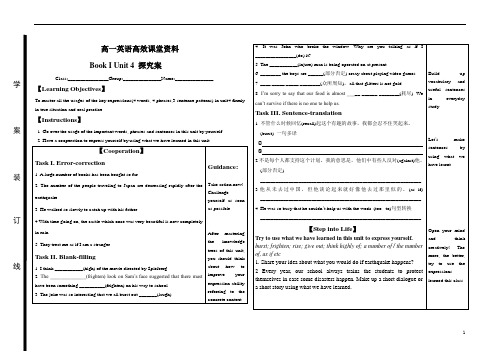
高一英语高效课堂资料Book I Unit 4 探究案Class:________________Group:_______________Name:_______________ 【Learning Objectives】To master all the usages of the key expressions(4 words, 4 phrases,3 sentence patterns) in unit4 firmly in true situation and oral practice.【Instructions】1. Go over the usage of the important words, phrases and sentences in this unit by yourself.2. Have a cooperation to express yourself by using what we have learned in this unit.学案装订线【Extensive Reading---Earthquake】A powerful earthquake, followed by numerous aftershocks, shook southern Japan Sunday morning. Hundreds of people were injured.The magnitude(n. 大小;量级;[地震] 震级;重要;光度) quake was felt as far away as South Korea. In southern Japan, it damaged homes, shattered(adj.破碎的;极度疲劳的) windows in high-rise office buildings and toppled(v. 倾倒;倒塌;摇摇欲坠) walls and stone statues(石像).At a kindergarten, a recital(n.朗诵,独奏会,独唱会) by students was getting underway when the quake struck. The tremor(n.震动,颤动,战栗,兴奋,地震) swayed(v. 影响;统治;使摇动) the room, and mothers ran to calm their panicked children.Officials say electrical power, gas and water services have been disrupted(v. 破坏;使瓦解) in many cities on Japan's main southern island of Kyushu. Skim the passageto know morenews about theearthquake andscan the usefulinformation thatis helpful to yourunderstanding ofthe passage.Japan's Meteorological Agency says the quake was centered in the Sea of Japan, about 70 kilometers off the coast of Kyushu. Seismologists at the agencysay this is the strongest quake to hit Kyushu in nearly 18 years.Officials say the quake is remarkable(adj.显著的,异常的,非凡的,值得注意的) in that it was extremely shallow, just nine kilometers below the seasurface.However, damage is extensive on the tiny island of Genkai at the mouth of Fukuoka Bay. Local government officials requested military helicopters bedispatched to the island to take the injured to hospitals.Both the prime minister's office and the National Police Agency have established crisis centers to gather information and coordinate(adj.同等的,协调的;n.同等者;vt.协作,协调) relief efforts.Authorities are advising people in southern Japan to stay away from the seacoast. The meteorological agency initially(adv.最初,开始) issued a tsunami(n.海啸) warning, but it was canceled about an hour after the first tremor.。
人教英语必修1 Unit4 grammar

Grammar
the restrictive attributive clause
关系代词:who / that / which/பைடு நூலகம்hom/whose
定语:用来修饰名词或代词的词、短语、从句;相当 于一个形容词。
The kinds of the Attribute:
1. A plane is a machine _th_a_t_/w__h_ic_h__can fly.(作_主___语)
2. This is a tree _t_h_a_t/_w_h_i_ch__ we planted.(作宾____语)
3. This is a girl t_h_a_t/_w_h_o__ studies hard.(作主___语) 4. The girl_t_h_a_t/_w_h_o_/_w_h_o_m__ I talked about is a friend of mine.(作_宾__语)
A.The man is called Smith.I saw him last week.
The man (Whom) I saw last week is called Smith.
B. Have you found the keys? You lost them.
Have you found the keys( which/that )
1) Miss Flower is the teacher whose house caught fire last week.
Of whom the
3) This is the book whose (of which the) cover is blue.
高一英语高效课堂资料B1u2复习2

Book I Unit 2 English around the world复习导学案Class:___ Group:____ No.:____ Name:________组内评价:_______教师评价:_____ 【Learning aims】:1. To consolidate the words, phrases and sentences in this unit; use them freely and flexibly.2. To learn to build the knowledge system by self-directed study and cooperation.I. Words:目标:单词全部熟记要求:根据音标记单词,边读边写,疯狂记忆1.电梯;升降机2.官方的adj.3.航行,航海n.4.本国的;本地人5.<美>公寓6.实际上adv.7. 逐渐地adv.8.词汇,词汇量__________ 9.后者的adj.10.流利地adv. 11.常常;频繁地adv. 12.命令n./vt.13. 请求,要求14.词语;表达n.15.辨认出;承认vt.16. 笔直的17.identity 18.lightning19.conquer____________ 20. enrich 21.blockII. Phrases:1.在…的末尾_________________2. 因为;由于_________________3. 走近;上来;提出________________4. 流利的做某事_________________5. .与…不同_________________6. 以…为基础_________________7. 现在;目前_________________ 8. 利用;使用_________________9. 许多的,大量的_____________ 10. ……的数量_________________11. 例如……_________________ 12. 扮演角色,起重要作用_______________ III. The usage of the words and phrases目标:熟记词汇在语境中的灵活运用并画出知识树。
Unit 4 Grammar 讲义-2021-2022学年高一英语牛津译林版(2020)必修第一册

译林版必修第一册Unit4单元语法--关系副词引导的限制性定语从句语法精析当先行词在定语从句中作状语时,通常要用关系副词引导定语从句。
常用的关系副词有where,when,why等。
1.关系副词wherewhere引导的定语从句的先行词往往是表示地点的名词(如place,room,house,spot等),关系副词在从句中作地点状语。
常用in which,at which,on which等代替。
They are playing in the park where(=in which) there are some flowers.他们正在有花的公园里玩耍。
The office where(=at which) the girl works is not far from here.这个女孩工作的办公室离这儿不远。
[温馨提示]①有一些先行词,如point,stage,position,case,condition等,属于抽象的地点名词,如果定语从句中缺状语,需要接where引导的定语从句。
You reach a point in your project where you just want to get the thing f inished.从事任何项目你都会进入一种境界:一心想完成它。
We reached a stage where we had to answer violence with violence.我们陷入了必须用暴力来对抗暴力的境地。
②where引导定语从句和状语从句的区别:引导定语从句时,where是关系副词,在从句中作地点状语,其前有表示地点的名词作先行词,从句修饰先行词;引导状语从句时,where是从属连词,从句修饰主句的谓语动词,where前面没有表示地点的名词。
He’s got into a situation where he is likely to lose control over the plane.(定语从句)他陷入了一种很可能会失去对飞机的控制的境地。
高一英语高效课堂资料B1U4语言学习

4.the →an 5.destroyed →were destroyed
6.their →our 7.was→were 8.bury →buried
9.but →so 10.high →highly
Ⅲ.单项填空 :
1—6 DADBC A
课内探究: On the afternoon of May 12th,2008, a big earthquake happened in Sichuan, China. The number of the dead is about seventy thousand. Wenchuan, a small city, was destroyed in the earre buried under the ground. After the earthquake, the army came to dig out those who were trapped. They rescued lots of people from the ruins of the earthquake . “No words are strong enough to express our thanks to the soldiers .” a student said with tears. It is believed that Wenchuan will come to life soon.
当堂检测:
I.用下面短语中的适当形式填空:
1.at an end
2. right away 3. think little of
4. are trapped in 5. dug out 6.bursting out
7.The number of 8. was buried in
高一英语高效课堂资料B5U2 grammar

高一英语高效课堂资料高一英语翻转课堂课时学案班级小组姓名________ 使用时间年月_____日编号5-2-4___第 1 页I saw an old man knocked down by a car just now.When I came in, I found a strange girl seated in the corner.3.V-ed 形式可作使役动词的宾语补足语:使役动词有:have, get, make, leave, keepEg.①He raised his voice to make herself heard by all the people in the hall.②I want to get my hair cut tomorrow.= I want to get the barber to cut my hair.= I want to let the barber cut my hair.注意:“have + 宾语+ 过去分词”可以表示两种含义:(1)表示“让某人做某事”I have had my bike repaired.(2)“遭遇到某种不幸;受到打击”My elder sister had her wallet stolen on a bus last month.4. 在“with + 宾语+过去分词”结构中:过去分词用作with的宾语补足语,过去分词与宾语间为动宾关系。
这一结构通常在句中作时间,方式,条件,原因等状语。
With + n. + V-ed .Eg.He usually works in her study with the door locked.The thief was brought in with his hands tied behind his back.With many brightly-colored flowers planted around the building,his house looks like a beautiful garden.IV. 请同学们观看微课<V-ed做宾补 >,进一步把握V-ed作宾补的用法V. 合作互学,解决疑难第2 页第3页第4页。
高一英语高效课堂资料Book1 Unit4 单元测试
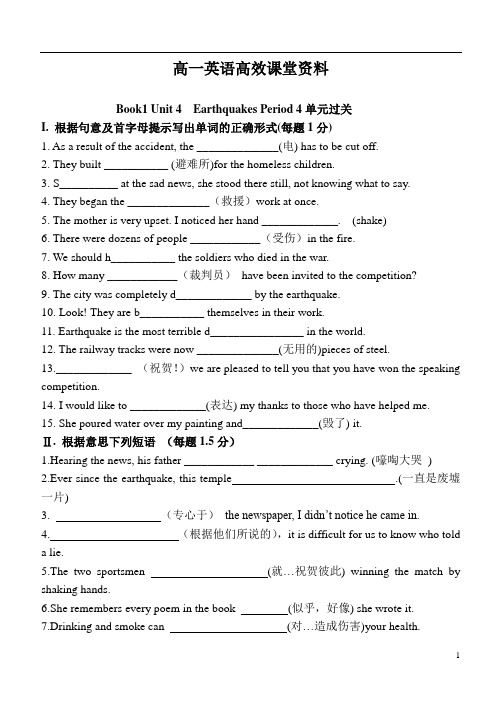
高一英语高效课堂资料Book1 Unit 4 Earthquakes Period 4单元过关I. 根据句意及首字母提示写出单词的正确形式(每题1分)1. As a result of the accident, the ______________(电) has to be cut off.2. They built ___________ (避难所)for the homeless children.3. S__________ at the sad news, she stood there still, not knowing what to say.4. They began the ______________(救援)work at once.5. The mother is very upset. I noticed her hand _____________. (shake)6. There were dozens of people ____________(受伤)in the fire.7. We should h___________ the soldiers who died in the war.8. How many ____________(裁判员)have been invited to the competition?9. The city was completely d_____________ by the earthquake.10. Look! They are b___________ themselves in their work.11. Earthquake is the most terrible d________________ in the world.12. The railway tracks were now ______________(无用的)pieces of steel.13._____________ (祝贺!)we are pleased to tell you that you have won the speaking competition.14. I would like to _____________(表达) my thanks to those who have helped me.15. She poured water over my painting and_____________(毁了) it.Ⅱ. 根据意思下列短语(每题1.5分)1.Hearing the news, his father ____________ _____________ crying. (嚎啕大哭)2.Ever since the earthquake, this temple .(一直是废墟一片)3. (专心于)the newspaper, I didn’t notice he came in.4. (根据他们所说的),it is difficult for us to know who tolda lie.5.The two sportsmen (就…祝贺彼此) winning the match by shaking hands.6.She remembers every poem in the book (似乎,好像) she wrote it.7.Drinking and smoke can (对…造成伤害)your health.8.The firemen five children (把…从…解救出来) the burning house yesterday.9. (这则令人震惊的消息) made me realize what terrible problems we would face.10. (为了纪念)the soldiers, the party was held.Ⅲ. 根据课文完成下列句子(每题3分)1.In the farmyards, the chickens and even the pigs were_______ ________ ______ _______ (紧张的不想吃食).2.But one million people of the city, who ________ _________ _________ these events (几乎都没有当回事), were asleep ________ ________(照常) that night.3.It seemed ______ ______ the world was ______ ______ ___ _(世界似乎到了末日).4.Some of the ______ _______ (救援人员) and doctors ______ ________ (被困) under the ruins.5. _______ hope was not lost. (并不是所有的希望都破灭了)Ⅳ.单句改错(每题1.5分)1. Hearing the joke, we all burst into laughing.2.Their friendship was at the end.3.Years of fighting left the city in ruin.4.Two-thirds of them died or was injured during the earthquake.5.Burying in a novel, the boy didn’t notice the meeting ended.6.A great number of soldiers was sent to rescue the people trapped in the earthquake.7.Judged from his accent, he may be from my hometown.8.The Oxford Advanced Learner’s Dictionary is a dictionary which h e often uses it.9.Yesterday I met the man in which company my father worked for ten years.10.I didn’t like the way which he talked to me .Ⅴ.完形填空(每题1分)I used to be a very self-centered person, but in the past two years I have really changed. I have started to think about other people 1 I think about myself. I am happy that I am becoming a _2 person.I think my 3 started when I was at Palomar College. At first, I just wanted to get my 4__ and be left alone. I thought I was smarter than everyone else, so I hardly ever 5 to anyone in my classes. By the end of my first semester, I was really6 . It seemed as if everyone but me had made friends and was having fun. So I tried a(n)7 I started asking people around me how they were doing, and if they were having trouble ,I 8_ to help. That was really a big 9 for me. By the end of the year, I had several new friends, and two of _10 are still my best friends today.A bigger cause of my new 11 , however, came when I took a part-time job at a Vista Nursing Home. One old lady there who had Alzheimer’s disease became my 12 . Every time I came into her room, she was so 13_ because she thought I was her daughter. Her real daughter never 14 her, so I took her place. She let me 15 that making others feel good makes me feel good, too, when she died, I was 16 , but I was very grateful to her.I think I am a much 17 person today than I used to be, and I hope I will not 18 these experiences. They have 19 me to care about other people more than about myself. I 20_ who I am today, and I could not say that a few years ago.1. A. since B. before C. or D. unless2. A. famous B. simple C. different D. skilled3. A. education B. career C. tour D. change4. A. balance B. homework C. degree D. interest5. A. talked B. wrote C. lied D. reported6. A. careful B. lonely C. curious D. guilty7. A. argument B. game C. experiment D. defense8. A. dared B. offered C. hesitated D. happened9. A. dream B. problem C. duty D. step10. A. us B. which C. them D. whom11. A. attitude B. hobby C. hope D. luck12. A. friend B. partner C. guide D. guest13. A. polite B. happy C. strange D. confident14. A. bothered B. answered C. visited D. trusted15. A. explain B. guess C. declare D. see16. A. homeless B. heartbroken C. bad-tempered D. hopeless17. A. quieter B. busier C. better D. richer18. A. forget B. face C. improve D. analyze19. A. forced B. preferred C. ordered D. taught20. A. miss B. like C. wonder D. expectⅥ.阅读七选五(每题2分)Public Speaking Training·Get a coach__1__ ,so get help. Since there are about a billion companies out there all ready to offer you public speaking training and courses, here are some things to look for when deciding the training that's right for you.·Focus on positivesAny training you do to become more effective at public speaking should always focus on the positive aspects of what you already do well. Nothing can hurt confidence more than being told that you aren't doing well. ___2__ , so good public speaking training should develop those instead of telling you what you shouldn't do.·____3___If you find a public speaking course that looks as though it's going to give you lots of dos and don'ts, walk away! Your brain is so full of what you're going to be talking about.__4__. As far as we're concerned, there are basically no hard and fast rules about public speaking. Your audience can be your friends.·You are a special person not a cloneMost importantly, good public speaking training should treat you as a special one, with your own personal habits. ___5__. Your training course should help you bring out your personality, not try to turn you into someone you're not.A. You aren't like anybody elseB. You already do lots of things wellC. Turn your back on too many rulesD. Check the rules about dos and don'tsE. Whatever the presentation, public speaking is toughF .The one thing you don't want is for them to fall asleepG. So trying to force a whole set of rules into it will just make things worse。
高一英语必修一unit4知识点总结
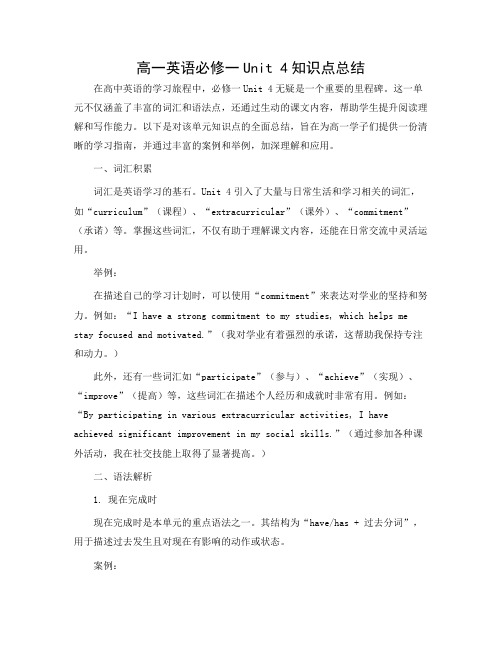
高一英语必修一Unit 4知识点总结在高中英语的学习旅程中,必修一Unit 4无疑是一个重要的里程碑。
这一单元不仅涵盖了丰富的词汇和语法点,还通过生动的课文内容,帮助学生提升阅读理解和写作能力。
以下是对该单元知识点的全面总结,旨在为高一学子们提供一份清晰的学习指南,并通过丰富的案例和举例,加深理解和应用。
一、词汇积累词汇是英语学习的基石。
Unit 4引入了大量与日常生活和学习相关的词汇,如“curriculum”(课程)、“extracurricular”(课外)、“commitment”(承诺)等。
掌握这些词汇,不仅有助于理解课文内容,还能在日常交流中灵活运用。
举例:在描述自己的学习计划时,可以使用“commitment”来表达对学业的坚持和努力。
例如:“I have a strong commitment to my studies, which helps me stay focused and motivated.”(我对学业有着强烈的承诺,这帮助我保持专注和动力。
)此外,还有一些词汇如“participate”(参与)、“achieve”(实现)、“improve”(提高)等,这些词汇在描述个人经历和成就时非常有用。
例如:“By participating in various extracurricular activities, I have achieved significant improvement in my social skills.”(通过参加各种课外活动,我在社交技能上取得了显著提高。
)二、语法解析1. 现在完成时现在完成时是本单元的重点语法之一。
其结构为“have/has + 过去分词”,用于描述过去发生且对现在有影响的动作或状态。
案例:小李在英语课上被问到:“Have you finished your homework?”(你完成作业了吗?)小李回答:“Yes, I have finished it.”(是的,我已经完成了。
高一英语高效课堂资料Book1Unit4 语言学习ding (2)

高一英语高效课堂资料Book1 Unit 4 Earthquakes Period2 语言学习导学案Learning aims:1. Master the 4 important words, 2phrases and 3sentences and use them freely.2. Do some Exx correctly according to the language points.【课前自主导学】Ⅰ、核心单词:1. burst vt. & vi. & n. (burst, burst)爆炸;胀裂;闯入;突然破裂;爆发1) That balloon will burst if you blow it up any more. (胀裂)2) She burst into laughter(out laughing) to hear the news. (突然大笑起来)3) He burst into the room without knocking.(闯入)☆要点归纳:burst 后可接一些介词或副词,构成的常用搭配有Eg.他如此感动以至于大哭起来。
2. ruin vt. 毁坏;毁灭。
既可指实际的东西,也可指抽象的东西。
n.[U]毁坏;毁灭[C](常用作复数)废墟1) The bad weather ruined my holiday in Guilin. What a pity!3) The castle is /lies now in ruins. 城堡现在已成废墟。
易混辨析: destroy/ruin/damage/1).If you con tinue to bury your head in the sand, it won’t be long before you find yourself left behind. 如果你再自欺欺人,那么不用多久,你就会发现自己落后了。
高一英语高效课堂资料Book1 Unit1 语言点

高一英语高效课堂资料Book1 Unit1 Friendship Period 2 语言学习导学案【Learning aims】1. To master the usage of 5words, 5 phrases and 4 sentence patterns deeply and improve the ability of writing short essays.2. To learn to analyze and summarize words with the help of examples through self-directed study and cooperation.3. To be passionate and devoted to English learning and experience the pleasure of learning .【课前自主导学】I. 重点单词1. add v addition. n1) Please add up your score and see how many points you get.请加起来你的分数看看你得了多少分。
2) The bad weather only added to our difficulties. 糟糕的天气只能增加我们的困难。
3)Please add some hot water to the cup.请往茶杯里加些热水。
4) The numbers added up to exactly 100. 这些数字的总是恰好是100.5)He expressed his thanks to me and added that he would come back.他表达了对我的感谢之情并补充说他还会来的。
归纳:add的词组add (…)up (把……) 加起来add to 增加add … to …增加add up to 总共是,总计为2. concern1) It is a problem that concerns us all. 这是一个关系到我们全体的问题。
高一英语人教课标必修1unit4grammar

高一英语人教课标必修1unit4grammarUnit 4GrammarThe Attributive clause 1 定语从句修饰, 限定What are attributes(定语)?1.He is an honest boy.(形容词)2.The falling/fallen leaves are flying in the sky.(现在/过去分词)3. What’s your telephone number?(名词)4.Marx found it important to study the situation in Russia. (介词短语)5.The foreigner who visited our school yesterday is from Canada.(从句) The positions of the attribute:(定语的位置) 1. This is a flower basket.2. This is a basket full of flowers. 3. This is a basket that I want to put flowers in.(单个的词作定语时要放于被修饰词的前面,短语或从句作定语时要放于被修饰词的后面。
) 定语从句的定义:在复合句中,修饰名词或代词的从句叫定语从句,定语从句相当形容词的作用在句中作定语。
被修饰的词叫做先行词,连接先行词和从句的叫关系词. e.g.The girl is Mary. Mary is brave andclever. 先行词关系词The girl who is brave and clever is Mary.定语从句主句He is an English teacher who likes singing songs. 先行词定语从句引导词I will never forget the days when we spent together.先行词引导词关系代词: who, whom, that, which, whosewherepwhenpwhy 关系副词:Join the two sentences, using the attributive clause.Example:1. a)The woman is a teacher.b)The woman lives next door. who/that lives next door is The woman _____________________ a teacher. The woman __________________ who/that is a teacher lives next door.2.a)The nurse is kind. b)The nurse looks after my sister.The nurse who/that looks after my sister is kind.3.a)W e watched the play “ Teahouse”. b)The play was written by Lao She. We watched the play “ Teahouse” which/taht was written by Lao She.4.a)The young man is a famous writer. b)You saw the young man yesterday The young man (who/whom/that) you saw yesterday is a famous writer.5. a)This is the house. b)Lu Xun oncelived in the house. This is the house which/that Lu Xun once lived in. 6. a)I know the doctor. b)His daughter studies abroad. I know the doctor whose daughter studies abroad.一. 关系代词who( 主), whom( 宾), that( 主,宾), 1). person--whose(所属关系)2.) things--which, that, whose(所属关系)1,which 指物,在句中作主语或宾语,作宾语时可以省略。
高一英语高效课堂资料B1U2 reading

(1) even if在句中引导__________从句,意为__________。
(2)本句翻译:____________________________________________________________
_____________________________________________________________
高一英语高效课堂资料
Book1 Unit2 English around the world
班级 小组 姓名 教师评价
【Learning aims】
1.To understand the passage and know the development of English by skimming,scanning and retelling.
2.To embrace the diversity of different languages and cultures.
【课前预习】
Step I. Pre-reading
Fill in the blanks and know the differences between American English & British English in vocabulary.
人教版高中英语必修一Book1Unit4Grammar(定语从句(一))
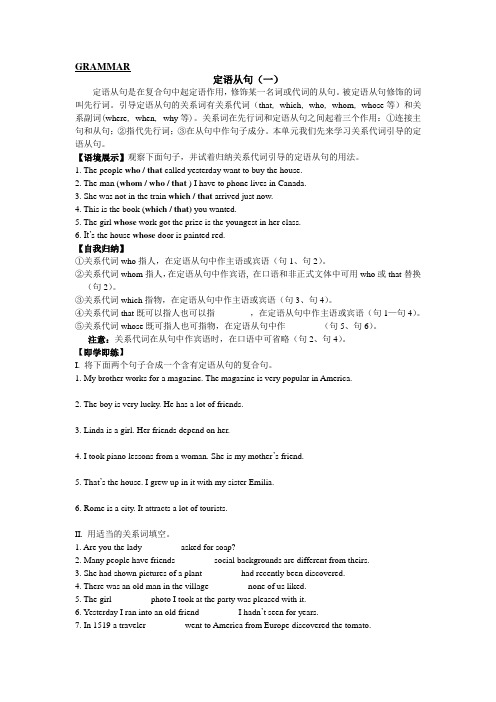
GRAMMAR定语从句(一)定语从句是在复合句中起定语作用,修饰某一名词或代词的从句。
被定语从句修饰的词叫先行词。
引导定语从句的关系词有关系代词(that, which, who, whom, whose等)和关系副词(where, when, why等)。
关系词在先行词和定语从句之间起着三个作用:①连接主句和从句;②指代先行词;③在从句中作句子成分。
本单元我们先来学习关系代词引导的定语从句。
【语境展示】观察下面句子,并试着归纳关系代词引导的定语从句的用法。
1. The people who / that called yesterday want to buy the house.2. The man (whom / who / that ) I have to phone lives in Canada.3. She was not in the train which / that arrived just now.4. This is the book (which / that) you wanted.5. The girl whose work got the prize is the youngest in her class.6. It’s the house whose door is painted red.【自我归纳】①关系代词who指人,在定语从句中作主语或宾语(句1、句2)。
②关系代词whom指人,在定语从句中作宾语, 在口语和非正式文体中可用who或that替换(句2)。
③关系代词which指物,在定语从句中作主语或宾语(句3、句4)。
④关系代词that既可以指人也可以指________,在定语从句中作主语或宾语(句1—句4)。
⑤关系代词whose既可指人也可指物,在定语从句中作________(句5、句6)。
注意:关系代词在从句中作宾语时,在口语中可省略(句2、句4)。
高一英语高效课堂资料Book1Unit4 语言学习
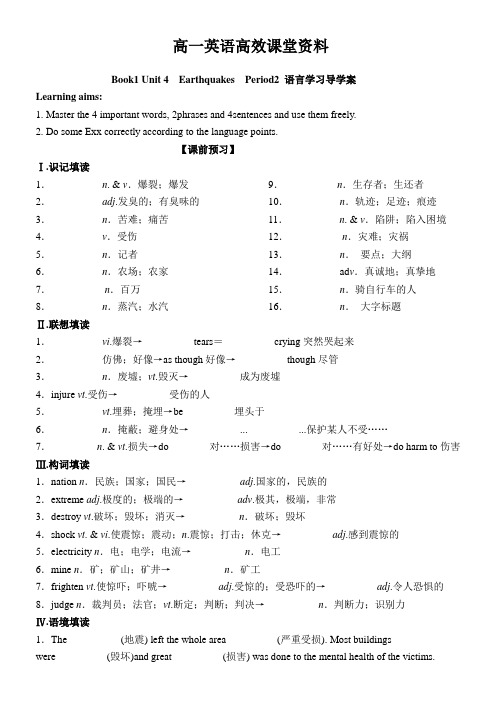
高一英语高效课堂资料Book1 Unit 4 Earthquakes Period2 语言学习导学案Learning aims:1. Master the 4 important words, 2phrases and 4sentences and use them freely.2. Do some Exx correctly according to the language points.【课前预习】Ⅰ.识记填读1.__________n. & v.爆裂;爆发2.__________adj.发臭的;有臭味的3.__________n.苦难;痛苦4.__________v.受伤5.__________n.记者6.__________n.农场;农家7.__________ n.百万8.__________n.蒸汽;水汽9.__________ n.生存者;生还者10.__________n.轨迹;足迹;痕迹11.__________n. & v.陷阱;陷入困境12.__________ n.灾难;灾祸13.__________n.要点;大纲14.__________ad v.真诚地;真挚地15.__________n.骑自行车的人16.__________n.大字标题Ⅱ.联想填读1.__________vi.爆裂→__________tears=__________crying突然哭起来2.__________仿佛;好像→as though好像→__________though尽管3.__________n.废墟;vt.毁灭→__________成为废墟4.injure vt.受伤→__________受伤的人5.__________vt.埋葬;掩埋→be__________埋头于6.__________n.掩蔽;避身处→__________...__________...保护某人不受……7._________n. & vt.损失→do________对……损害→do________对……有好处→do harm to伤害Ⅲ.构词填读1.nation n.民族;国家;国民→__________ adj.国家的,民族的2.extreme adj.极度的;极端的→__________ adv.极其,极端,非常3.destroy vt.破坏;毁坏;消灭→__________ n.破坏;毁坏4.shock vt. & vi.使震惊;震动;n.震惊;打击;休克→__________adj.感到震惊的5.electricity n.电;电学;电流→__________ n.电工6.mine n.矿;矿山;矿井→__________ n.矿工7.frighten vt.使惊吓;吓唬→__________adj.受惊的;受恐吓的→__________adj.令人恐惧的8.judge n.裁判员;法官;vt.断定;判断;判决→__________ n.判断力;识别力Ⅳ.语境填读1.The __________(地震) left the whole area__________(严重受损). Most buildingswere__________(毁坏)and great__________(损害) was done to the mental health of the victims.2.In the__________(灾难),__________________(许多矿工) were__________(掩埋) underground. It took the __________(救援) workers much time to __________them __________(掘出). Luckily, most of them were still quite well and only some got__________(受伤的).3.He ______________(冲击) the house______________(立刻) after he heard the crying__________(好像) somebody was crying for help.4.The prediction that many__________(灾难) will happen and that the earth willbe______________________(终结) soon __________(震惊) all the people.5.______________________(大量的)people ________________________(被困在) the fallen buildings, which were built 20 years ago.Ⅴ.句式填读1.____________ the world was at an end!仿佛到了世界末日!2.Thousands of families were killed and many children ________________.成千上万的家庭被毁,许多孩子成了孤儿。
高一英语高效课堂资料B1U2语言学习
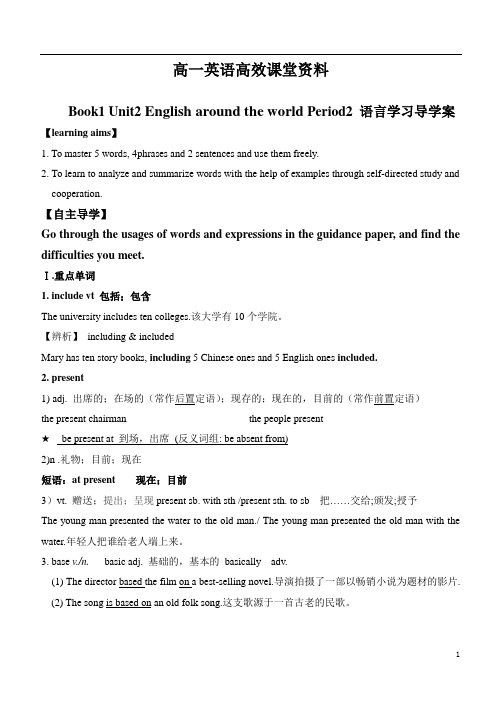
高一英语高效课堂资料Book1 Unit2 English around the world Period2 语言学习导学案【learning aims】1. To master 5 words, 4phrases and 2 sentences and use them freely.2. To learn to analyze and summarize words with the help of examples through self-directed study and cooperation.【自主导学】Go through the usages of words and expressions in the guidance paper, and find the difficulties you meet.Ⅰ.重点单词1. include vt 包括;包含The university includes ten colleges.该大学有10个学院。
【辨析】including & includedMary has ten story books, including 5 Chinese ones and 5 English ones included.2. present1) adj. 出席的;在场的(常作后置定语);现存的;现在的,目前的(常作前置定语)the present chairman___________________ the people present______________________★be present at 到场,出席(反义词组: be absent from)2)n .礼物;目前;现在短语:at present 现在;目前3)vt.赠送;提出;呈现present sb. with sth /present sth. to sb 把……交给;颁发;授予The young man presented the water to the old man./ The young man presented the old man with the water.年轻人把谁给老人端上来。
- 1、下载文档前请自行甄别文档内容的完整性,平台不提供额外的编辑、内容补充、找答案等附加服务。
- 2、"仅部分预览"的文档,不可在线预览部分如存在完整性等问题,可反馈申请退款(可完整预览的文档不适用该条件!)。
- 3、如文档侵犯您的权益,请联系客服反馈,我们会尽快为您处理(人工客服工作时间:9:00-18:30)。
高一英语高效课堂资料Book1 unit4 Earthquakes Period 3 GrammarThe attributive clauses定语从句【Learning Aims:】1. Learn rules of the Attributive Clause and the relative pronouns: who, whom, which, that, as, whose.2. Use it to express freely through practice【课前预习】Ⅰ关系代词引导的定语从句【课文原句再现】1. But the one million people of the city, who thought little of these events, were asleep as usual that night.2. Then, later that afternoon, another big quake which was almost as strong as the first one shook Tangshan.3. Workers built shelters for survivors whose homes had been destroyed.学生可从学过的课文中再找至少3个定语从句4._____________________________________________________________________________5. _____________________________________________________________________________6. _____________________________________________________________________________【课内探究】【规律精点】1含义:定语从句是指在复合句中,修饰名词或代词的从句.被定语从句所修饰的名词或代词叫做先行词. 定语从句分为限制性定语从句和非限制性定语从句。
引导定语从句的词叫关系词分为关系代词和关系副词常用的关系代词:that、who、whom、whose、which、as 在从句中作主语、宾语、表语或定语。
常用的关系副词:: when、where、why在从句中只作状语。
关系词在定语从句中的作用:1)连接主从句2)指代先行词3)充当句子成分。
2. 解定语从句题目三技巧:①找出先行词;(定语从句修饰的名词或代词);②看先行词在定语从句中的语法功能(做主语、宾语、表语、定语或状语);③选择合适的关系词。
先行词在从句中做主、宾、表、定语时,选关系代词;先行词在从句中做状语时,用关系副词。
补充:不能引导定语从句的引导词:_____________, _____________.I still remember the days when we worked together.I always dream of living in a world where there is no trouble .II.1.只用that不用which的情况【典例呈现】1) We should do all that is useful to the people.2) It is the only thing that we can do.3) This is the first place that I want to visit.4) This is the most interesting book that I have ever read5) We talked about the things and persons that we were interested in.6) Who is the man that is standing by the door?Which is the dictionary (that) you bought yesterday?7) The village is no longer the one that it used to be 10 years ago.【规律精点】①当先行词是不定代词all, everything, anything, nothing, something, much, little, few, none, the one 等或先行词被all, any, no, much, little, few, every 等限定词所修饰时。
②当先行词被the only, the very, the last等修饰时;③当先行词是序数词或被序数词the f irst /second /third…所修饰时;④当先行词是形容词或被形容词最高级所修饰时;⑤当先行词既有人又有物时;⑥当特殊疑问词由who或which 引导时,为避免重复,常用that代替who或which⑦当关系代词在定语从句中作表语时。
2. 只用which不用that的情况【典例呈现】He is always making the same mistakes, which makes his teacher angry.He gave many excuses none of which is reasonable.【规律精点】①引导非限制性定语从句,指代整个主句,用which不用that②放介词后引导从句III.whose引导的定语从句Nobody wants the house whose roof has fallen in.the roof of which has fallen in.of which the roof has fallen in.【规律精点】whose+名词=_________________________=_________________________Ⅳ. 关系代词as和which引导定语从句的区别:1、非限制性定语从句中,as和which都可以在定语从句中做主语或宾语,指代前面整个句子。
He married her, as/which was natural.2、as 引导非限制性定语从句,可放在主句之前,或主句之后,甚至可以切割一个主句;which 引导的非限制性定语从句只能放在主句之后。
另外,as有“正如……,正像……”(1) As is known to all, China is a developing country.(2) He is from the south, as we can see from his accent.(3) John, as you know, is a famous writer.(4) Tom was always late for school, which made his teacher angry.3、当先行词由such, the same修饰时,常用as(1) He is not such a fool as he looks. (2) This is the same book as I lost last week.★She wore the same dress that she wore at Mary’s wedding.她穿着她在Mary婚礼上穿过的一条裙子。
(同类同物)★She wore the same dress as her young sister wore.她穿着和她妹妹所穿的一样的裙子。
(同类不同物)注意:定语从句such…as …与结果状语从句such… that…的区别:as在所引导的定语从句中作主语,宾语;that在结果状语从句中不做成分(3)He has such a good laptop as I want to buy.(4)He has such a good laptop that I want to buy one.4、as引导非限制性定语从句的常用搭配:As we all know 众所周知;as is well known (to all) 众所周知;As we expect 正如我们预料的那样as is expected 正如预料的那样As often happens 正如经常发生的as is often the case情况常常这样;V. 以the way为先行词的定语从句且定语从句中缺状语时,通常由in which, that引导,而且通常可以省略。
The way in which/ that/省略he answered the question was surprising.Ⅵ.“介词+which/whom”引导的定语从句1.当介词放在关系代词的前面时,介词宾语只用关系代词which 或whom 且不能省略。
当先行词是人时用关系代词whom,当先行词是物时用关系代词which 。
例句:①This is the house in which Shakespeare used to live.②In the dark street, there wasn’t single person to whom she could turn for help.③Recently I bought an ancient vase, the price of which was very reasonable.2.确定介词的原则不外乎三条:一是根据从句中动词与介词的习惯搭配,二是根据先行词和介词的习惯搭配,三是根据句子意思表达的需要。
(1) 看定语从句中动词与介词的搭配例句:①The documents for which they were searching have been recovered.②This is a subject about which we might argue for a long while.(2) 看先行词与介词的搭配习惯例句:①On the blackboard the teacher wrote a sentence, the meaning of which I don’t under stand. ②I’ll never forget the day on which she said goodbye to me.(3)考查根据句意确定介词例句:①I am looking for my glasses, without which I can’t watch TV clearly.② He was educated at the local high school, after which he went on to Beijing University.Ex.用适当的介词或关系代词完成下列句子①(2012·湖南高考)Care of the soul is a gradual process which even the small details of life should be considered.② I wanted to find someone_________ whom I could discuss books and music.③ She was educated at Beijing University, _________which she went on to have her advanced study abroad. (全国II)④(2011湖南卷)Julie was good at German, French and Russian , all of _________ she spoke fluently.⑤(2010浙江)The settlement is home to nearly 1,000 people, many of left their village homes for a better life in the city.⑥ (2012山东) Maria has written two novels, both of ________ have been made into television series. Ⅶ. 定语从句中的主谓一致问题1.当关系代词that, which, who在定语从句中作主语时,定语从句中的谓语动词的单复数与先行词的数保持一致,即:当先行词是复数时,谓语动词用复数形式,当先行词是单数时,谓语动词用单数形式。
